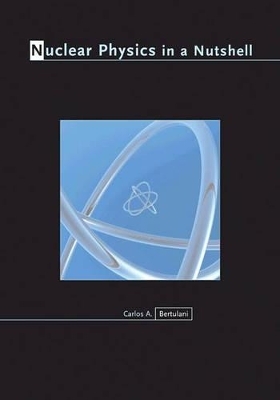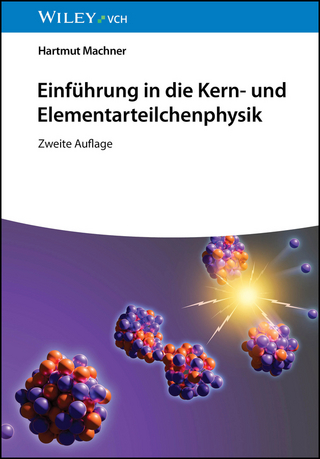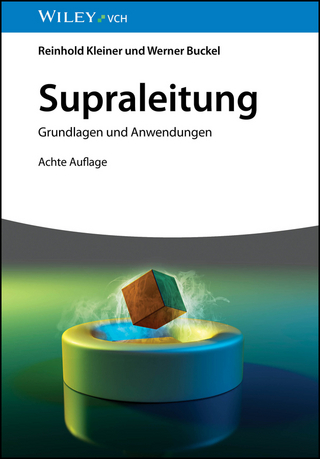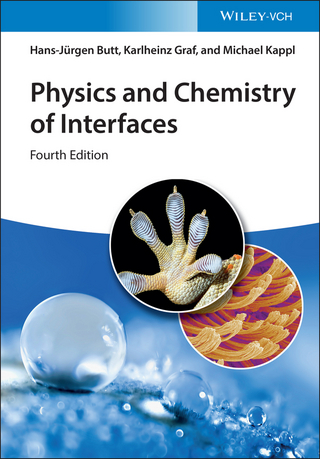
Nuclear Physics in a Nutshell
Princeton University Press (Verlag)
978-0-691-12505-3 (ISBN)
Nuclear Physics in a Nutshell provides a clear, concise, and up-to-date overview of the atomic nucleus and the theories that seek to explain it. Bringing together a systematic explanation of hadrons, nuclei, and stars for the first time in one volume, Carlos A. Bertulani provides the core material needed by graduate and advanced undergraduate students of physics to acquire a solid understanding of nuclear and particle science. Nuclear Physics in a Nutshell is the definitive new resource for anyone considering a career in this dynamic field. The book opens by setting nuclear physics in the context of elementary particle physics and then shows how simple models can provide an understanding of the properties of nuclei, both in their ground states and excited states, and also of the nature of nuclear reactions.
It then describes: nuclear constituents and their characteristics; nuclear interactions; nuclear structure, including the liquid-drop model approach, and the nuclear shell model; and recent developments such as the nuclear mean-field and the nuclear physics of very light nuclei, nuclear reactions with unstable nuclear beams, and the role of nuclear physics in energy production and nucleosynthesis in stars. Throughout, discussions of theory are reinforced with examples that provide applications, thus aiding students in their reading and analysis of current literature. Each chapter closes with problems, and appendixes address supporting technical topics.
Carlos A. Bertulani is Research Professor of Physics at the University of Tennessee and the Oak Ridge National Laboratory. He is the author of "Physics of Radioactive Nuclear Beams, Introduction to Nuclear Physics", and "Introduction to Nuclear Reactions".
Introduction 1 0.1 What is Nuclear Physics? 1 0.2 This Book 3 Chapter 1: Hadrons 4 1.1 Nucleons 4 1.2 Nuclear Forces 5 1.3 Pions 7 1.4 Antiparticles 8 1.5 Inversion and Parity 8 1.6 Isospin and Baryonic Number 10 1.7 Isospin Invariance 13 1.8 Magnetic Moment of the Nucleons 14 1.9 Strangeness and Hypercharge 15 1.10 Quantum Chromodynamics 21 1.11 Exercises 29 Chapter 2: The Two-Nucleon System 31 2.1 Introduction 31 2.2 Electrostatic Multipoles 32 2.3 Magnetic Moment with Spin-orbit Coupling 34 2.4 Experimental Data for the Deuteron 36 2.5 A Square-well Model for the Deuteron 38 2.6 The Deuteron Wavefunction 41 2.6.1 Angular momentum coupling 41 2.6.2 Two particles of spin 42 2.6.3 Total wavefunction 43 2.7 Particles in the Continuum: Scattering 46 2.8 Partial Wave Expansion 49 2.9 Low Energy Scattering 53 2.10 Effective Range Theory 59 2.11 Proton-Proton Scattering 61 2.12 Neutron-Neutron Scattering 64 2.13 High Energy Scattering 65 2.14 Laboratory and Center of Mass Systems 65 2.15 Exercises 68 Chapter 3: The Nucleon-Nucleon Interaction 71 3.1 Introduction 71 3.2 Phenomenological Potentials 72 3.3 Local Potentials 72 3.3.1 Nonlocal potential 78 3.4 Meson Exchange Potentials 80 3.4.1 Yukawa and Van der Waals potentials 80 3.4.2 Field theory picture 84 3.4.3 Short range part of the NN interaction 86 3.4.4 Chiral symmetry 87 3.4.5 Generalized boson exchange 89 3.4.6 Beyond boson exchange 91 3.5 Effective Field Theories 95 3.6 Exercises 96 Chapter 4: General Properties of Nuclei 98 4.1 Introduction 98 4.2 Nuclear Radii 98 4.3 Binding Energies 101 4.4 Total Angular Momentum of the Nucleus 104 4.5 Multipole Moments 104 4.6 Magnetic Dipole Moment 106 4.7 Electric Quadrupole Moment 109 4.8 Excited States of Nuclei 111 4.9 Nuclear Stability 114 4.10 Exercises 116 Chapter 5: Nuclear Models 119 5.1 Introduction 119 5.2 The Liquid Drop Model 119 5.3 The Fermi Gas Model 124 5.4 The Shell Model 128 5.5 Residual Interaction 142 5.6 Nuclear Vibrations 144 5.7 Nuclear Deformation 149 5.8 The Nilsson Model 150 5.9 The Rotational Model 153 5.10 Microscopic Theories 160 5.10.1 Hartree-Fock theory 160 5.10.2 The Skyrme interaction 162 5.10.3 Relativistic mean field theory 164 5.11 Exercises 166 Chapter 6: Radioactivity 170 6.1 Introduction 170 6.2 Multiple Decays--Decay Chain 171 6.3 Preparation of a Radioactive Sample 173 6.4 Secular Equilibrium 174 6.5 Natural Radioactive Series 174 6.6 Radiation Units 176 6.7 Radioactive Dating 177 6.8 Properties of Unstable States--Level Width 179 6.9 Transition Probability--Golden Rule 181 6.10 Exercises 183 Chapter 7: Alpha-Decay 185 7.1 Introduction 185 7.2 Theory of ?-Decay 185 7.3 Angular Momentum and Parity in ?-Decay 191 7.4 Exercises 194 Chapter 8: Beta-Decay 195 8.1 Introduction 195 8.2 Energy Released in ss-Decay 196 8.3 Fermi Theory 197 8.4 The Decay Constant--The Log ft Value 202 8.5 Gamow-Teller Transitions 204 8.6 Selection Rules 206 8.7 Parity Nonconservation in ss-Decay 206 8.7.1 Double ?-Decay 211 8.8 Electron Capture 213 8.9 Exercises 215 Chapter 9: Gamma-Decay 218 9.1 Introduction 218 9.2 Quantization of Electromagnetic Fields 218 9.2.1 Fields and gauge invariance 218 9.2.2 Normal modes 220 9.2.3 Photons 221 9.3 Interaction of Radiation with Matter 224 9.3.1 Radiation probability 227 9.3.2 Long wavelength approximation 228 9.4 Quantum and Classical Transition Rates 235 9.5 Selection Rules 240 9.6 Estimate of the Disintegration Constants 241 9.7 Isomeric States 243 9.8 Internal Conversion 244 9.9 Resonant Absorption--The Mossbauer Effect 249 9.10 Exercises 255 Chapter 10: Nuclear Reactions--I 258 10.1 Introduction 258 10.2 Conservation Laws 260 10.3 Kinematics of Nuclear Reactions 261 10.4 Scattering and Reaction Cross Sections 265 10.5 Resonances 270 10.6 Compound Nucleus 273 10.7 Mean Free Path of a Nucleon in Nuclei 276 10.8 Empirical Optical Potential 277 10.9 Compound Nucleus Formation 282 10.10 Compound Nucleus Decay 290 10.11 Exercises 294 Chapter 11: Nuclear Reactions--II 298 11.1 Direct Reactions 298 11.1.1 Theory of direct reactions 301 11.2 Validation of the Shell Model 303 11.3 Photonuclear Reactions 306 11.3.1 Cross sections 307 11.3.2 Sum rules 308 11.3.3 Giant resonances 312 11.4 Coulomb Excitation 315 11.5 Fission 319 11.6 Mass Distribution of Fission Fragments 321 11.7 Neutrons Emitted in Fission 324 11.8 Cross Sections for Fission 325 11.9 Energy Distribution in Fission 327 11.10 Isomeric Fission 328 11.11 Exercises 331 Chapter 12: Nuclear Astrophysics 334 12.1 Introduction 334 12.2 Astronomical Observations 335 12.2.1 The Milky Way 335 12.2.2 Dark matter 336 12.2.3 Luminosity and Hubble's law 337 12.3 The Big Bang 338 12.4 Stellar Evolution 341 12.4.1 Stars burn slowly 341 12.4.2 Gamow peak and astrophysical S-factor 342 12.5 The Sun 347 12.5.1 Deuterium formation 348 12.5.2 Deuterium burning 350 12.5.3 3He burning 351 12.5.4 Reactions involving 7Be 352 12.6 The CNO Cycle 354 12.6.1 Hot CNO and rp process 355 12.7 Helium Burning 357 12.8 Red Giants 360 12.9 Advanced Burning Stages 362 12.9.1 Carbon burning 362 12.9.2 Neon burning 364 12.9.3 Oxygen burning 365 12.9.4 Silicon burning 365 12.10 Synthesis of Heaviest Elements 367 12.11 White Dwarfs and Neutron Stars 368 12.12 Supernova Explosions 370 12.13 Nuclear Reaction Models 375 12.13.1 Microscopic models 375 12.13.2 Potential and DWBA models 376 12.13.3 Parameter fit 377 12.13.4 Statistical models 377 12.14 Exercises 379 Chapter 13: Rare Nuclear Isotopes 385 13.1 Introduction 385 13.2 Light Exotic Nuclei 388 13.2.1 Halo nuclei 390 13.2.2 Borromean nuclei 393 13.3 Superheavy Elements 395 13.4 Exercises 400 Appendix A: Angular Momentum 401 A.1 Orbital Momentum 401 A.2 Spherical Functions 402 A.3 Generation of Rotations 402 A.4 Orbital Rotations 403 A.5 Spin 404 A.6 Ladder Operators 406 A.7 Angular Momentum Multiplets 409 A.8 Multiplets as Irreducible Representations 412 A.9 SU(2) Group and Spin 413 A.10 Properties of Spherical Harmonics 414 A.10.1 Explicit derivation 414 A.10.2 Legendre polynomials 415 A.10.3 Completeness 416 A.10.4 Spherical functions as matrix elements of finite rotations 417 A.10.5 Addition theorem 417 Appendix B: Angular Momentum Coupling 419 B.1 Tensor Operators 419 B.1.1 Transformation of operators 419 B.1.2 Scalars and vectors 420 B.1.3 Tensors of rank 2 421 B.1.4 Introduction to selection rules 422 B.2 Angular Momentum Coupling 423 B.2.1 Two subsystems 423 B.2.2 Decomposition of reducible representations 424 B.2.3 Tensor operators and selection rules revisited 426 B.2.4 Vector coupling of angular momenta 427 B.2.5 Wigner-Eckart theorem 428 B.2.6 Vector Model 429 Appendix C: Symmetries 432 C.1 Time Reversal 432 C.2 Spin Transformation and Kramer's Theorem 433 C.3 Time-conjugate Orbits 435 C.4 Two-component Neutrino and Fundamental Symmetries 436 C.5 Charge Conjugation 437 C.6 Electric Dipole Moment 438 C.7 CPT -Invariance 439 Appendix D: Relativistic Quantum Mechanics 440 D.1 Lagrangians 440 D.1.1 Covariance 441 D.2 Electromagnetic Field 442 D.3 Relativistic Equations 444 D.3.1 Particle at rest 446 D.3.2 Covariant form: ss matrices 446 D.4 Probability and Current 448 D.5 Wavefunction Transformation 448 D.5.1 Bilinear Covariants 450 D.5.2 Parity 451 D.6 Plane Waves 451 D.6.1 Summary of plane wave spinor properties 453 D.6.2 Projection operators 454 D.7 Plane Wave Expansion 454 D.8 Electromagnetic Interaction 455 D.9 Pauli Equation 455 D.9.1 Spin-orbit and Darwin terms 457 Appendix E: Useful Constants and Conversion Factors 459 E.1 Constants 459 E.2 Masses 460 E.3 Conversion Factors 460 References 461 Index 469
| Erscheint lt. Verlag | 23.4.2007 |
|---|---|
| Reihe/Serie | In a Nutshell |
| Zusatzinfo | 50 line illus. 118 tables. |
| Verlagsort | New Jersey |
| Sprache | englisch |
| Maße | 178 x 254 mm |
| Gewicht | 936 g |
| Themenwelt | Naturwissenschaften ► Physik / Astronomie ► Atom- / Kern- / Molekularphysik |
| ISBN-10 | 0-691-12505-8 / 0691125058 |
| ISBN-13 | 978-0-691-12505-3 / 9780691125053 |
| Zustand | Neuware |
| Haben Sie eine Frage zum Produkt? |
aus dem Bereich


